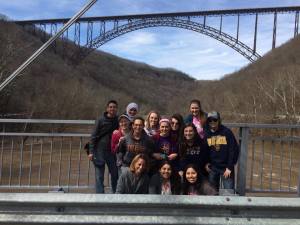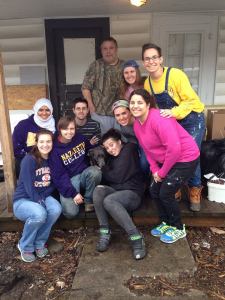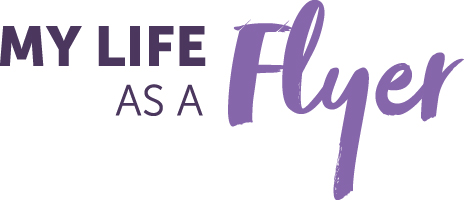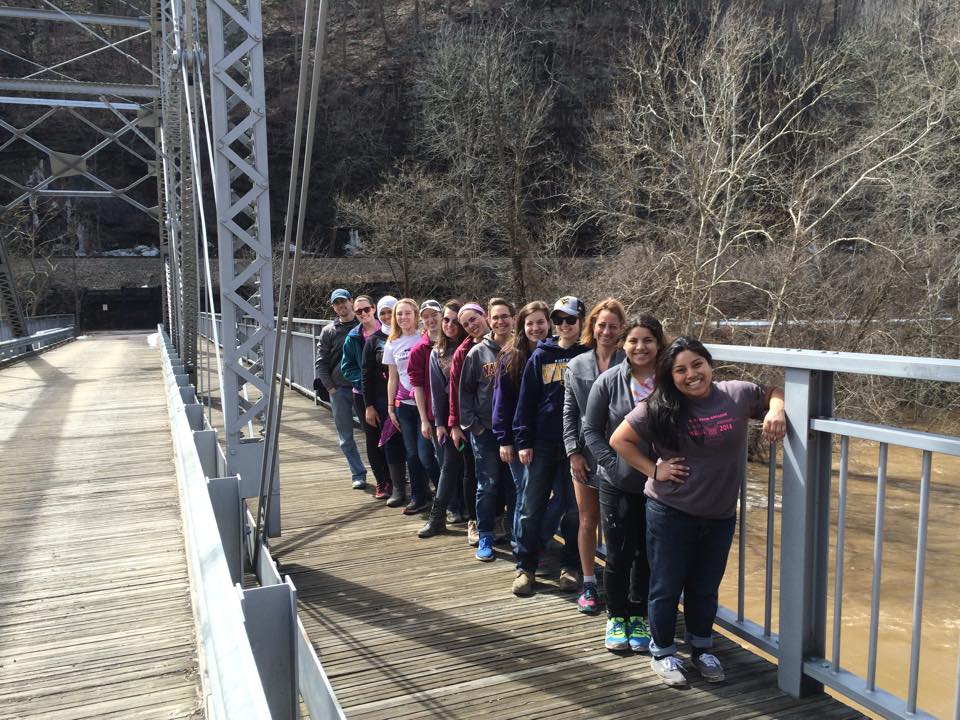Every year, the Center for Civic Engagement helps sponsor opportunities for students to go to different communities to give helping hands. I recently went on an alternative spring break (ASB) trip to Oak Hill, West Virginia with 12 other members of Nazareth’s community. I’ll discuss what we did, who we met, what we/I learned, and why people should do an ASB.
What We Did: We worked with a few people our age who were part of the Southern Appalachian Labor School (SALS) and helped repair houses that were either empty or owned by people living in poverty. Our days consisted of alternating between working on houses and cleaning up the closed elementary school, which SALS is currently trying to convert into a community center. When we were off-site, we performed work such as painting, insulation, electrical work, and drywall. When we were at the school, we cleaned out old classrooms that were full of junk and painted. We also spent half a day at the New River Gorge National Park where we spent a few hours hiking and seeing some breathtaking views.

Who We Met:
- The two people our age were Kelsey and Tyler and neither of them have the intention of going to college. They both shared a little bit about themselves but the most meaningful thing I took away from them was the sense of community they have, they know they aren’t living the best lifestyles but their family and friends are what keep them going in terms of support.
- Another person we met was Dan and he waited 12 years for someone to help him repair his house, which began in 2014, and then waited another year to see it completed, which is what we did. Dan is college-educated with a master’s degree and formerly worked for Bausch and Lomb. He seemed to be in his mid-40s without a job and showed no sign of changing the way he currently lives. This saddened most of us on the trip and actually inspired us to want to push those around us to make the most of our education.

This is some of us with Dan after we painted and did drywall on the first day at his house. - Towards the end of the trip, I met a man named Bill and he was definitely different than some of the other people we met. He said that he is addicted to food rather than drugs and alcohol, meaning he isn’t the stereotypical person living in poverty abusing substances. He is a veteran and was able to go to school to earn a degree through a local organization. Unfortunately, he was six credits short of graduating with a bachelor’s degree and never finished. Even more surprising, he said that college-aged veterans could go to college for free through the program but simply would not.
Poverty has a significant impact on many communities and those who shared their stories with us shared the impacts living such a lifestyle are having on them.
What We/I Learned:
- We learned about suburban poverty, which is something most of us didn’t know much about beforehand. In Oak Hill, homelessness is different than what some of us would consider homelessness. I know I consider it someone without a roof or shelter but in Oak Hill, it refers to the crowding of multiple people in homes not meant for more than it can hold. There is only one homeless person in Oak Hill and he actually stays in the old school that we stayed at and SALS helps take care of him.
- Poverty has different meanings in different parts of the country and it affects each region differently. There is poverty in Rochester but there are also many people who have a strong footing in life, meaning there are multiple lifestyles in the area. In West Virginia, almost everyone was living in poverty and there was not really another lifestyle. The area we visited is simply not attractive for companies to invest and therefore there is no infrastructure to provide more than minimum wage jobs. This has forced people in the area to either live in poverty for their entire life or move out-of-state in order to escape poverty.
- We had shared reflections every night where we would share highs and lows of our days. A majority of the highs were centered on us realizing how rewarding we felt and how we’d like to incorporate civic engagement in our future paths.
- One thing that I learned was how amazing it felt to be essentially selfless for a week. It was extremely rewarding to see how a simple act of goodwill that consisted of simple tasks made such an impact for others. I asked Kelsey and Tyler about the work that six of us did in one day and how long that would’ve taken them. They responded by saying it would’ve taken them weeks to do what we did in one day.
Why Do an ASB: It is such a humbling, rewarding, and inspiring opportunity to do for a week. It was absolutely amazing to give back to a community that I may only see once in my life with people who wanted to help. I had been dreaming since freshman year to go on one of these trips but sadly couldn’t due to sporting conflicts. When senior year came, I knew this was my last chance to go on a trip like this and I must say it was a trip of a lifetime. Between all the emotions I felt with performing service and making some great friends, I knew there was no better way to spend my last spring break.
What other civic engagement opportunities does Nazareth offer? In-class service learning is one of the many.

